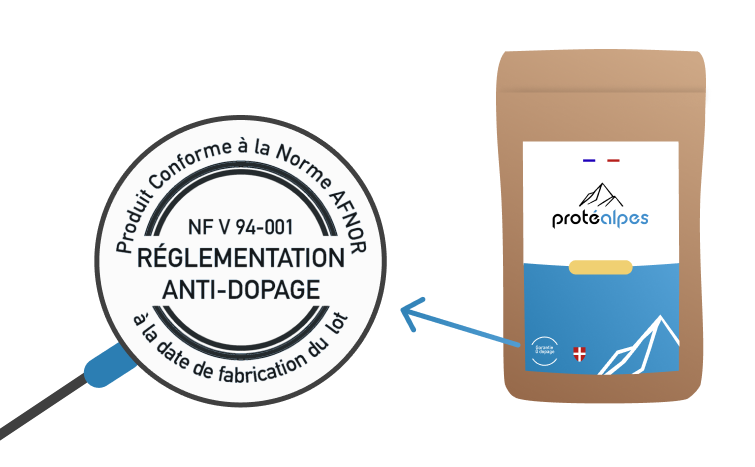Virtually all bodybuilders, and an increasing number of endurance athletes, consider taking whey at one time or another. This attraction to protein powders is accompanied by many questions, amplified by the sometimes complex vocabulary that surrounds the world of dietary supplements: creatine, bcaa, amino acids, tryptophan, arginine, steroids, anabolics... The list is enough to scare you!
Among the questions about whey's side effects, some are particularly frequent. Is taking whey protein like doping? Is muscle mass gain directly linked to protein powder consumption? Can whey make you put on weight or, on the contrary, cause sudden weight loss? What are the side effects of taking whey?
We've already answered some of these questions. Today, we're going to look at the possible undesirable effects of this protein powder. Note that we're focusing on the health impact only, but we'll also be covering the ecological consequences of protein powder in a separate article.
What is whey?

A number of preconceived ideas surround this product, and many beginners wonder what whey is. This question is just as common among endurance athletes as it is among fitness and bodybuilding enthusiasts. Many people believe that this protein powder is derived from a combination of chemicals. This belief is false, as whey is indeed a dietary supplement, but it is simply the result of milk filtration. Raw whey is in fact an unprocessed, natural ingredient.
Whey protein corresponds to milk whey, filtered and made into a dry powder. This product has not been processed or enriched in any way. Its consumption should therefore not be harmful to health. However, producers often add additives to improve taste and texture. Doping substances and other undesirable compounds can be found in the composition of some whey products on the market. That's why we encourage you to avoid protein powders with long lists of ingredients and additives.
As a general rule, the different whey varieties, including whey isolate, improve muscle fiber recovery and growth. This family of dietary supplements is designed to supplement protein intake.
By providing your body with sufficient protein post-workout, you can more effectively repair the micro-injuries suffered by your muscles after each workout. Amino acids, and in particular BCAAs, are used to regenerate and develop new muscle fibres. Amino acids, and in particular BCAAs, are used to regenerate and develop new muscle fibers.
Does whey have side effects?
At first glance, whey has no side effects. It's a natural product. Taking whey is equivalent to drinking whey, the liquid on top of yoghurt. Whey" is essentially made up of proteins. This substance is rich in essential amino acids and BCAAs: leucine, isoleucine, valine.
So can whey be dangerous to your health? On paper, no. But not all whey products are created equal. As we explained above, whey can end up being contaminated by undesirable substances, mainly due to the addition of additives. By choosing a product with additives, you expose your body to potential side effects.
For example, sports nutrition specialists are concerned about the effects of the sweeteners present in whey. These molecules, such as sucralose or aspartame, have a sweetening power hundreds of times greater than common sugar (sucrose). Although this makes it possible to use them in minute quantities, this property is ultimately harmful to the consumer. It habituates the brain to excessively sweet flavors and reduces sensitivity to sugar. Ultimately, these compounds will drive athletes and body-builders to adopt an ever sweeter daily diet. Fortunately, this sensitivity quickly returns to normal once sweeteners are stopped.
Apart from this harmful effect, sweeteners can also disrupt the glucagon/insulin system, putting you at risk of metabolic disorders. These substances also harm the intestinal microbiota by disrupting bacterial flora. Last but not least, their metabolites are not yet known and could be dangerous.

Fortunately, whey without additives is available on the market. These are, in principle, of better quality, as they do not need to be "enhanced" with additives. These dietary supplements are therefore much better for your health and enable effective supplementation, without the risk of doping, if certified. That said, we still encourage you to choose your whey carefully by looking at its composition, and by taking an interest in the brand values on their website.
Contraindications: who can take whey protein?
If you're lactose intolerant, most whey products are very low in lactose. If you're lactose intolerant, don't hesitate to ask the brand you're interested in for exact lactose levels, via their contact form for example.
If you're allergic to milk proteins, whey is unfortunately totally contraindicated, so you'll need to turn to other protein sources, such as vegetable proteins.
What are the effects of excessive consumption?
Whey must be dosed correctly. Its purpose is to supplement protein intake. As such, the quantity of whey to be consumed on a daily basis is determined by taking into account the amount of protein provided by the athlete's diet. The usual target is 1.3 to 1.6 g/kg/d for endurance athletes. On the other hand, the ideal intake is around 1.6 to 2 g/kg/d to optimize weight gain for bodybuilding. Exceeding these thresholds would be pointless. We take a closer look at this subject here: how to take your whey?
Beyond the prescribed dosage, you can expect a few inconveniences. Excess protein will be oxidized and/or may be used to build up new fat reserves. What's more, acidification of the body and skin rashes are to be feared in the most sensitive cases.
Is taking whey addictive?
Whey is a powder derived directly from milk. As such, its consumption does not expose you to any addiction. What's more, whey is neither a drug nor a medication. Dietary supplements and supplementation should be a source of pleasure, not a constraint or a source of worry. Usually, you take your whey shaker after training, at rest, in a moment of calm.
Does whey consumption expose you to liver, kidney or heart problems?
We often hear that consuming protein powder can cause heart problems, or that taking whey every day puts a strain on the kidneys and liver. However, no study has confirmed that taking whey protein increases the risk of liver or kidney disease, or causes problems of this type, without any underlying disease. However, if you suffer from renal and/or hepatic insufficiency, it's best not to load the body with protein, and so taking whey is contraindicated unless a specialist doctor advises otherwise. In all cases, it's always a good idea to seek the advice of a health professional, in order to tailor this supplementation to your objectives and practice.
As you can see, quality whey has no side effects or health risks if taken correctly. The only real contraindications are milk allergies or lactose intolerance. If you're looking for reassurance, our article on why take whey should enlighten you on its various benefits. To find out more, here are some articles which may be of interest to you:
- How do you incorporate whey into your diet?
- Which whey is right for a top-level athlete?
- Is our whey organic?
- Is whey safe for teenagers?
Whey that makes you want to vomit, what can you do about it and what causes it?
Being essentially made up of whey, a natural constituent of milk, whey should be well tolerated by the body. There is therefore no biological reason why whey should make you want to vomit. However, this could be the case if the product contains a lot of additives.
Some of these components can leave an unpleasant taste and even cause gastrointestinal disorders. If you have consumed a whey that makes you want to vomit, check its composition.
Ideally, we opt for protein powders without additives. These products are healthier, and save you from potential digestive problems.
As whey is derived from milk, athletes may also feel the urge to vomit because they are not used to milky flavours, or simply don't like dairy products. In this case, prefer products with a very light taste, such as Protéalpes whey cocoa red fruit.
If you like coffee, you can also add instant coffee to your shaker with additive-free vanilla whey or cocoa whey protein. Remember that, for supplementation to be a long-term process, it must be a source of pleasure, not a constraint.
If whey makes you want to vomit, don't force yourself. You need to find another way of satisfying your protein requirements, by incorporating whey into a recipe, for example, or into cottage cheese.














